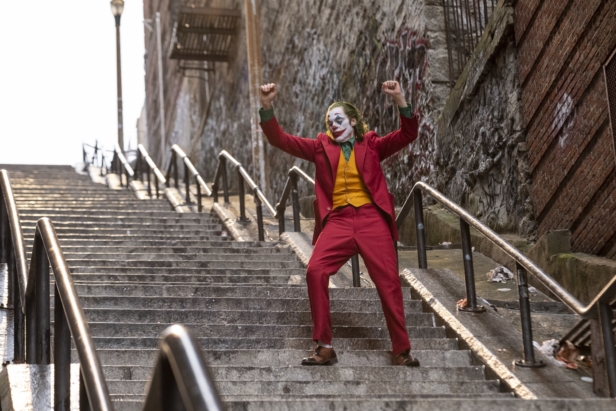What makes the Joker such a threatening villain? Until now, he’s been a psychopathic enigma, wreaking havoc across Gotham and taunting Batman with his maniacal cackle. But Todd Phillip’s Joker attempts to dive into the psyche of the iconic villain, fishing around in murky waters for over 2 hours in the hope of revealing an explanation for such evil.
While the Wayne family do make an appearance in the film, Joker plays as more of a spin-off solo tale rather than part of the current DC Extended Universe (Jared Leto appeared as the Joker in 2016’s Suicide Squad, and is slated to appear in two more films in the same role) While not directly referencing other superhero movies, much like Christopher Nolan’s Oscar winning Batman trilogy, Joker draws on decades of source material; Arthur’s storyline takes some influence from Alan Moore and Brian Bolland’s critically acclaimed 1988 graphic novel The Killing Joke, in which The Joker is a failed stand-up comedian. Much of Joker actually draws from 70s and 80s American cinema instead of the recent span of superhero movies, taking influence from Scorsese’s Taxi Driver and The King Of Comedy in both its main character and in its depiction of a city in decay.
Joaquin Phoenix plays Arthur Fleck who, fresh out of a psychiatric hospital and working as a clown, is determined to become a stand-up comedian, despite the fact that even his own mother doesn’t think he’s funny. As he’s slowly abandoned by his support system, he’s left to spiral out of control and be consumed by the chaos mounting on the dark streets of Gotham.
Phoenix has lost a considerable amount of weight to play the Joker, and it’s an incredibly physical performance that may remind some of his role as a hulking contract killer in Lynne Ramsay’s You Were Never Really Here. He dances, twists and contorts his battered body into angular, jutting shapes, his mental state manifesting itself in his movements.
Joker is told mostly from Arthur’s perspective, and he proves to be a highly unreliable narrator as he dreams up scenarios in his head, the reveries playing out in the film as if they’re really happening. Nodding to The King Of Comedy, a twinkling eyed Robert DeNiro makes an appearance as Murray, the comedy talk show host that Arthur fantasises about meeting and being validated by.
The film begins in a pretty dark place – Arthur is mugged by a gang of teens – and it only gets more and more miserable as it goes on, with no relief in sight. There are some jokes, but they feel in bad taste, largely aimed at marginalised characters. Gotham City is impressively grimy and helps build an ominous atmosphere, but there’s nothing hopeful to hold on to here: just cynicism, and when a serial murderer is the only character available to sympathise with, it feels like Phillips is pushing the audience towards trying to understand a character not deserving of being understood.
Joker tries to question the exploitation of mental illness for entertainment, and the consequences of society abandoning its weakest members. But the film is in turn, exploiting mental illness and using it as an excuse for Arthur’s nefarious actions. This feels tone-deaf in a time where mental illness is being wrongly linked to mass violence in the US. The film is aware enough to draw from great films about toxic masculinity and loneliness, but not enough to critique Arthur’s behaviour instead of painting him as a helpless loner driven to violence by forces out of his control.
Joker was seen and reviewed at Venice Film Festival 2019.
